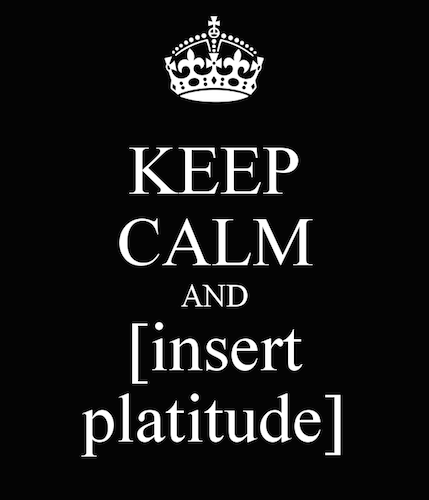The Danger of Platitude

Saw this in my feed the other week, and it struck me as incredibly ironic. Think about it - how often are people spouting platitudes like this one with no real thought put into them, seemingly all for the likes?
This particular profile posts stuff like this all the time. It pops up in my feed once or twice a day and it’s always the same - platitude written out in a “notetaking” app with no real explanation in the description of why it was posted, what it means, or what I’m supposed to do with it.
It’s not that I don’t agree with the sentiment, although in this case I’m not 100% on board that the WORST thing you can be is the same as everybody else. I think maybe being a mass murderer or a child rapist would be worse than being the same as everyone else.
The problem is, we LOVE to prop up the sentiment behind platitudes because it’s so much easier than the alternative, which is taking a hard look at our lives and actually applying that sentiment in a realistic and productive way.
To make matters even worse, platitudes are really hard to disagree with without looking like a douche (or an asshole). So, for the touter of tautologies (the person using the platitude), there is virtually no down side, and all upside. People will halfheartedly agree with everything you say, and basically nobody will _dis_agree, so you’re led into a false sense of importance and social clout.
Besides the obvious reasons platitudes should be avoided (they’re annoying, and they can be hurtful when deployed in place of true feeling, as in comforting the grieving), there are two more that aren’t often considered, but which I personally think are even more detrimental to both the individual and society as a whole.
1. Marginal decrease in Attention Currency⌗
Platitudes are like a credit card. Very convenient for situations when you just can’t find the right words, but that convenience comes at a cost. Every time you use one, you owe a debt that has to be balanced. And the more platitudes you use, the chance you have of receiving additional credit in the future.
The debt is almost imperceptible at first, but it compounds every time you use it without balancing that debt with some kind of truly heartfelt and honest expression.
We all know those people that, in an effort to stay in everyone’s good graces, resorts almost exclusively to this sort of communication style. You never leave those interactions feeling bad about yourself, but at the same time, you kind of feel like you wasted your time.
And that’s the problem with being someone who speaks that way. People stop paying attention.
2. The Sentiment Itself Loses Value⌗
Even worse, in my opinion, than what happens to the individual in these situations is what happens to the sentiment itself. Take the image at the top of this post, for example. It is important to be unique and live the live that you want to live. It is important to do things because you want to, not just because it is “socially acceptable”.
But every time that saying is used in this way - cast ‘as pearls before swine’ so to speak, the sentiment itself becomes diluted in everyone’s mind. So much so that it is no longer something that people, young and old, are really thinking about.
So the fact that so many people are throwing that around as a platitude is, in my opinion, the central driving force behind the fact that most people nowadays are just trying to fit in.
So where does that leave us?⌗
The affect of all this, which actually may not be all that bad, is that in order to express these types of sentiments, we have to go into a lot more detail and explain what we mean and why we mean it. Platitudes are considered “universal” for a reason, but their application is so individual and personal.
So, for example, I wrote a fairly long article not too long ago called Incentive is King that went into a fair amount of detail about how you’re more likely to get what you want if you’re patient and understanding with people who can help you get it. When I posted that article, one of the comments I got back was:
And yes, you could indeed sum up that entire post with that platitude, or the one that I deconstructed at the end which was essentially:
The point I’m making is I could have just used the platitudes, but it wouldn’t have meant anything to anyone, and it wouldn’t have expressed my particular take and implementation of the idea. Now, you know not only how I stand on that idea/issue, but you can see very clearly how I actually do that.
So I guess what I’m trying to say is don’t hide behind platitude - uncover your truest self and lay it bare for the world to see. Be raw, be vulnerable, be ok with being wrong and unpopular. That’s what is meant by “the worst thing you can be is the same as everyone else”.